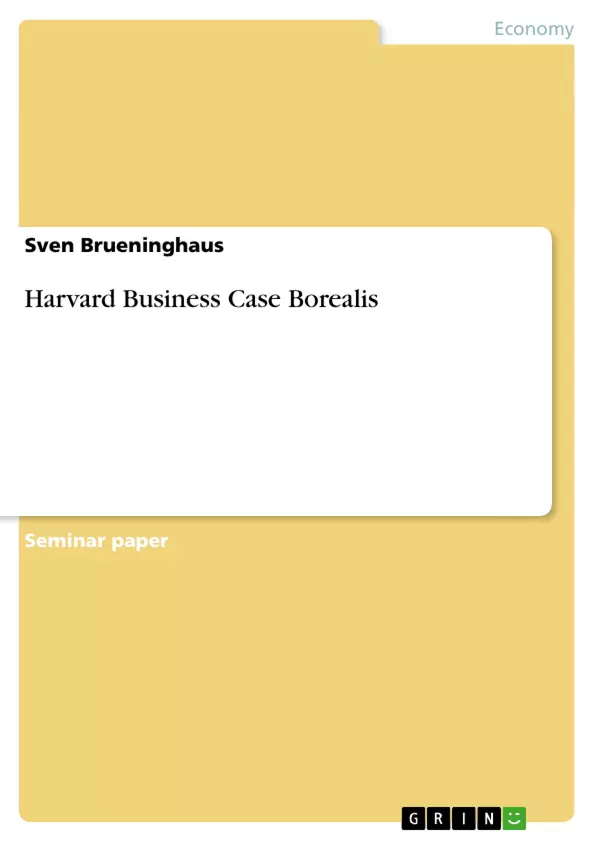Borealis is the outcome of a merger of the petrochemical divisions of Statoil Norway and Neste Oy Finland in 1994. It is a fully integrated and the biggest European polyolefins producer with production plants in different European countries and it’s head office in Copenhagen / Denmark. Directly after the merger Borealis had to create a common budget for the combined entity. The separate budgets of Statoil and Neste in the past had the traditional purposes of budgets: make planning and controlling easier for the management. The head of budgeting of Neste Oy became head of corporate control of Borealis and he was willing to leave the traditional budgeting behind and replace it by a new and innovative management steering approach with different purposes. During a period of three years he abandoned the traditional budgeting process and replaced it by a conglomerate of different
management tools.
This case describes the reason why and how it came to the different budgeting approach and what kind of concept was implemented instead of the traditional budgeting process. It also includes the hopes, which the Borealis management had with the different approach and the results of it. In the following shall be discussed what the advantages and the disadvantages of the new financial and steering system are compared with the abandoned budgeting system either from a theoretical and practical point of view. For this discussion the traditional budgeting process is described in the first place. It includes the budgeting process within Borealis and in theory. Then the new approach of Borealis is described in part 3. In part 4. the advantages will be discussed and in part 5 the disadvantages will be figured out and discussed. In the last part a conclusion will be done, which will try to judge if the new financial and steering approach within Borealis does really achieve it’s expected purposes compared with the abandoned budgeting system.
Inhaltsverzeichnis (Table of Contents)
- Introduction
- The abandoned budgeting system of Borealis
- Principles of the new financial and steering system at Borealis
- Advantages of the new system
- Disadvantages of the new system
- Changes in the companies performance
- Conclusion
Zielsetzung und Themenschwerpunkte (Objectives and Key Themes)
This case study examines the decision of Borealis, a leading European polyolefins producer, to abandon its traditional budgeting system and adopt a new, more flexible financial and steering approach. The case analyzes the reasons behind this shift, the specific tools implemented, and the advantages and disadvantages of the new system compared to the traditional budgeting process.
- Transition from traditional budgeting to a new financial and steering system
- Reasons for abandoning the traditional budgeting system
- Key elements of the new financial and steering system
- Advantages and disadvantages of the new approach
- Performance impact and effectiveness of the new system
Zusammenfassung der Kapitel (Chapter Summaries)
- Introduction: Introduces Borealis, its history, and the initial challenges faced after its merger. This section also outlines the objectives of the case study and how the analysis will be structured.
- The abandoned budgeting system of Borealis: Explores the reasons behind Borealis' decision to abandon its traditional budgeting system, including dissatisfaction with the existing process and the desire for a more strategic and flexible approach. It also delves into the theoretical foundation of traditional budgeting and its limitations in practice.
- Principles of the new financial and steering system at Borealis: Describes the key elements of the new financial and steering system adopted by Borealis, replacing the traditional budgeting process. This section may focus on the new tools and methodologies implemented.
- Advantages of the new system: Examines the potential benefits of the new financial and steering system in comparison to the traditional budgeting process. This section might discuss aspects such as improved flexibility, strategic alignment, and resource allocation.
- Disadvantages of the new system: Discusses the potential drawbacks of the new system, highlighting potential challenges such as implementation complexity, potential resistance from employees, and the need for adjustments to the existing organizational structure.
Schlüsselwörter (Keywords)
This case study focuses on key concepts such as traditional budgeting, financial and steering systems, corporate control, strategic management, performance measurement, organizational change, and decision-making. The case aims to analyze the effectiveness of alternative financial and steering approaches compared to traditional budgeting in a large multinational corporation.
Frequently Asked Questions
What is the Borealis case study about?
It examines how Borealis, following a merger, abandoned traditional budgeting in favor of a more innovative and flexible management steering approach.
Why did Borealis decide to abandon traditional budgeting?
The management was dissatisfied with the limitations of traditional processes and sought a system that allowed for better strategic alignment and flexibility in a dynamic market.
What replaced the traditional budgeting process?
Borealis implemented a conglomerate of different management tools and methodologies designed for modern corporate control and steering.
What are the advantages of the new steering system?
Potential benefits include improved resource allocation, better strategic focus, and the ability to react more quickly to environmental changes.
What were the challenges or disadvantages of the shift?
Challenges included implementation complexity, potential employee resistance, and the necessity of adjusting the existing organizational structure.
When did the merger that created Borealis take place?
Borealis was formed in 1994 through the merger of the petrochemical divisions of Statoil Norway and Neste Oy Finland.
- Quote paper
- Sven Brueninghaus (Author), 2003, Harvard Business Case Borealis, Munich, GRIN Verlag, https://www.grin.com/document/16547



